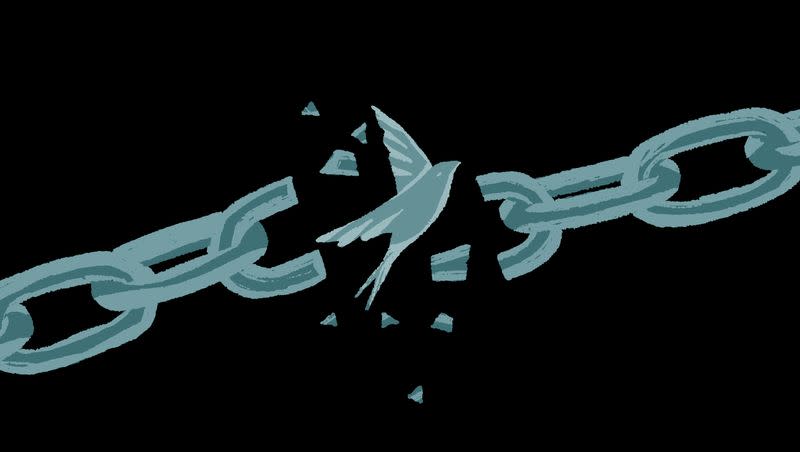Opinion: Peacebuilding in a time of deep fracturing

Today, on the International Day of Peace, Russia sent a barrage of missiles into Ukraine, targeting energy infrastructure early in the morning — part of an invasion into a sovereign country that has ground on for 548 days.
More than 1,200 children under age 5 have died in the last four months inside camps in Sudan, where two warring, power-hungry factions don’t seem to care who gets caught in the crossfire. And in Washington, a government shutdown is looming as anger dominates the discussion.
Closer to home, this week has featured stories of leaders of nonprofit organizations based in Utah who allegedly scammed people for their own gain, whether for fame, wealth, power or worldly gratification. The response in some quarters has been to threaten to kill the messenger.
Literally.
It’s exhausting
A brand-new study from Pew Research found that 65% of American adults are always or often exhausted when they think about politics, and another 25% are sometimes exhausted. More than half (55%), say they are often or always angry, with another 34% that are sometimes angry about politics. Close personal relationships have fractured because of the “us vs. them” contempt for others that has become pervasive.
Did I mention that today is the International Day of Peace?
Related
Opinion: ‘Contention never leads to inspired solutions.’ How our words can motivate violence or love
How do we fix it?
How do we, the exhausted majority, begin to repair some of the deep rifts we see all around us today?
We must be willing to turn first, to lay down our own weapons of war, whether those are literal physical weapons, the verbal attacks we feel justified in engaging in, or the need to be keyboard warriors, ready to spread hate at a word. We must soften our own hearts, no matter how justified we may feel in doing otherwise.
Becoming a peace builder requires action. There are multiple quotes floating around out there that say basically the same thing. Peace is not the absence of conflict. Similarly, peacebuilding is not achieved through passivity and it doesn’t mean appeasement.
In one of the first articles I authored for the Deseret News, I wrote about being a stone catcher instead of a stone thrower, as Bryan Stevenson wrote about in his book “Just Mercy.” It was sheer happenstance that later that same day, Elder Dale G. Renlund of the Quorum of the Twelve Apostles in The Church of Jesus Christ of Latter-day Saints, gave a talk on “Infuriating Unfairness” in general conference that also mentioned being stone catchers.
Church President Russell M. Nelson has spoken often and recently about the need to decrease contention. In April of this year, he said, bluntly. “I am greatly concerned that so many people seem to believe that it is completely acceptable to condemn, malign and vilify anyone who does not agree with them. Anger never persuades. Hostility builds no one. Contention never leads to inspired solutions.”
He’s not the only religious leader preaching a need for less contention. Pope Francis, in an interview with the U.S. Catholic “America Magazine” late last year said that “Polarization is not Catholic. A Catholic cannot think either-or ... and reduce everything to polarization. The essence of what is Catholic is both-and.” When there is polarization, he said, “a divisive mentality arises, which privileges some and leaves others behind.”
Arthur Brooks, who has spoken and written often on the problem of contempt, told BYU graduates in 2019 that “We need something more radical than civility — we need love.”
What does that look like?
Peacebuilding and conflict resolution are built on a foundation of seeing people as people, of seeing their humanity and inherent dignity. It means turning first and it means staying open to collaborative problem-solving. It doesn’t mean that there are never disagreements.
OK, we might say to ourselves, what if “they” are the problem? I can’t talk to “them.” “They” will never change. “They” are the ones who hurt me. Do we tell ourselves we’d be willing to listen if “they” realize “they” are the problem and admit the error of their ways?
Doesn’t matter. See them as people and turn first.
That’s hard. I know. Our natural response is to “armor up,” as Brené Brown calls it. Chad Ford describes it this way: “OK, I’m under duress, I need to protect myself, I need to protect my family, I need to protect my community, I need to protect my faith. And I’m going to pick up a sword, and I’m going to go to battle.”
Still, the answer is, put down your sword and turn first.
Stay curious, instead of staying in judgment. “Tell me more about that,” or “I’m not sure I understand — can you help me?” Just because an experience hasn’t happened to you doesn’t mean it hasn’t happened to others. Could their life experiences give them a different perspective?
I’m encouraged that more and more, we are hearing about ways to disagree better, to engage our braver angels and to treat each other with dignity in the political arena.
You won’t be surprised to learn that I cheered inside when BYU President C. Shane Reese said in his inaugural address that BYU will foster a unique learning environment that will “empower us to be peacemakers in an ever-more divisive society.”
Eleanor Roosevelt summed it up well: “It isn’t enough to talk about peace. One must believe in it. And it isn’t enough to believe in it. One must work at it.”
Let’s get to work.
Holly Richardson is the editor of Utah Policy.

